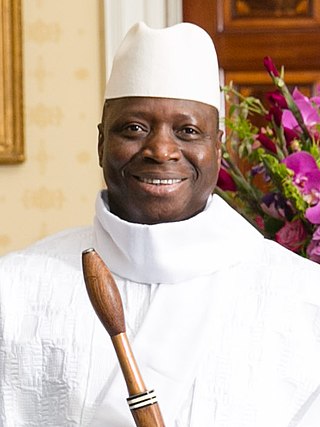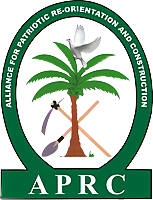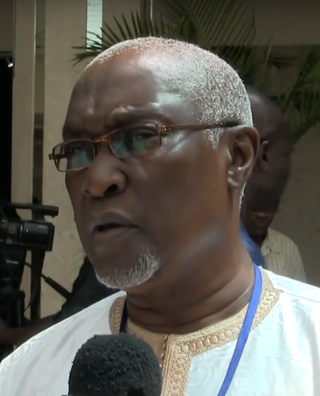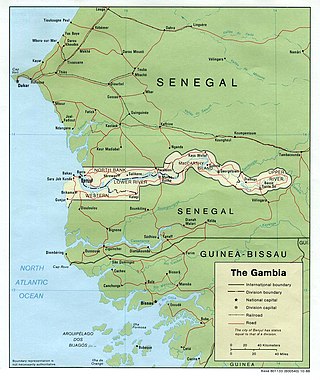Related Research Articles

The Gambia, officially the Republic of The Gambia, is a country in West Africa. It is the smallest country within mainland Africa and is surrounded by Senegal, except for its western coast on the Atlantic Ocean. The Gambia is situated on both sides of the lower reaches of The Gambia River, the nation's namesake, which flows through the centre of The Gambia and empties into the Atlantic Ocean, and elucidates the long shape of the country. It has an area of 11,300 square kilometres (4,400 sq mi) with a population of 1,857,181 as of the April 2013 census. Banjul is The Gambian capital and the country's largest metropolitan area, while the largest cities are Serekunda and Brikama.

Politics of The Gambia takes place within the framework of a presidential republic, whereby the President of The Gambia is both head of state and head of government, and of a multi-party system. Executive power is exercised by the government. Legislative power is vested in both the government and parliaments.

Yahya Abdul-Aziz Jemus Junkung Jammeh is a Gambian politician and former military officer who was the leader of The Gambia from 1994 to 2017, firstly as chairman of the Armed Forces Provisional Ruling Council (AFPRC) from 1994 to 1996 and then as President of the Gambia from 1996 to 2017.

The Alliance for Patriotic Reorientation and Construction (APRC) is a political party in The Gambia. Founded by army officers who staged 1994 coup, it was the ruling party from 1996 to 2016 under President Yahya Jammeh.

The People's Progressive Party is a political party in the Gambia. It was the dominant ruling party of the House of Representatives and the presidency from 1962 to 1994. The president throughout this time period was Dawda Jawara. The People's Progressive Party lost power after the 1994 Gambian coup d'état, a military coup led by young, junior military officers. The Alliance for Patriotic Reorientation and Construction (APRC) then became the dominant party of the Gambia. The People's Progressive Party remains active, but lacking the same level of support it garnered in the 20th century.
Kukoi Samba Sanyang was a Gambian politician and leader of the unsuccessful 1981 coup d'état against the government of Dawda Jawara.

Lesbian, gay, bisexual, and transgender (LGBT) persons in the Gambia face legal and social challenges not experienced by non-LGBT residents. Same-sex sexual activity is illegal for both males and females in the Gambia. Criminalisation commenced under the colonial rule of the British. The 1933 Criminal Code provides penalties of prison terms of up to fourteen years. In 2014, the country amended its code to impose even harsher penalties of life imprisonment for "aggravated" cases. While the United States Department of State reports that the laws against homosexual activity are not "actively enforced", arrests have occurred; the NGO Human Rights Watch, reports regular organised actions by law enforcement against persons suspected of homosexuality and gender non-conformity.

In the 1994 Gambian coup d'état, a group of soldiers led by 29-year-old Lieutenant Yahya Jammeh seized power in a bloodless coup d'état on the morning of 22 July, ousting Dawda Jawara, who had been President of The Gambia since its independence in 1970.
The 2014 Gambian coup d'état attempt broke out during the night of 30 December 2014, when gunfire erupted in the Gambian capital of Banjul.

Presidential elections were held in The Gambia on 1 December 2016. In a surprise result, opposition candidate Adama Barrow defeated long-term incumbent Yahya Jammeh. The election marked the first change of presidency in The Gambia since a military coup in 1994, and the first transfer of power by popular election since independence from the United Kingdom in 1965.

Adama Barrow is a Gambian politician and real estate developer who has served as President of the Gambia since 2017.

The Gambian constitutional crisis occurred following presidential elections in December 2016, in which challenger Adama Barrow achieved an upset victory over longtime incumbent Yahya Jammeh. It eventually concluded after a military intervention by the Economic Community of West African States (ECOWAS) led to Jammeh’s departure from the country.

The ECOWAS military intervention in the Gambia or the ECOWAS Mission in The Gambia – initially code-named Operation Restore Democracy – is an ongoing military intervention in The Gambia by several member states of the Economic Community of West African States.

Masaneh Nyuku Kinteh is a retired Gambian Army officer who served as Chief of the Defence Staff until his removal on 5 March 2020 by President Adama Barrow. He was the Gambian Chief of Mission in Havana, Cuba, from 2012 to 2017, and was previously Chief of the Defence Staff from 2009 to 2012. He was retired with the rank of lieutenant general in 2012, having previously also served as Deputy Chief of the Defence Staff in 2009, and shifted to the Foreign Service. He was reinstated as the Chief of Defence Staff in 2017 but redeployed him to the Foreign Service in 2020, becoming the ambassador to China.

Omar Amadou Jallow was a Gambian politician who was the Minister of Agriculture in President Adama Barrow's cabinet. Jallow was also the leader of the People's Progressive Party, which held two seats in the National Assembly at the time of his death.
The April 2000 Gambian student massacre was the killing of 14 people by Gambian police officers and soldiers on the 10 April 2000 at a student protest in Banjul, the Gambia. The protest had been called following two separate incidents - the beating to death of secondary school student Ebrima Barry by firefighters, and the rape of a 13-year-old girl by a uniformed police officer - and the lack of investigation of both of those incidents. Despite firing live ammunition into the protesters after government buildings had been damaged, no charges have been brought against those involved, and the Yahya Jammeh government suppressed commemoration of the event. Adama Barrow's government has since promised to investigate the shooting.
The Truth, Reconciliation and Reparations Commission (TRRC) is a truth commission in The Gambia to investigate the Yahya Jammeh era from 1994 to 2017. The process from the announcement of the commission to its launch lasted from 20 July 2017 to 15 October 2018. Its executive secretary is Baba Galleh Jallow, its lead counsel is Essa M. Faal, and the chairperson of the 11-strong commission is Lamin J. Sise.
Baba Galleh Jallow is a Gambian academic and journalist who was appointed as executive secretary of the Truth, Reconciliation and Reparations Commission (TRRC) in February 2018.
Capital punishment remains a legal penalty for multiple crimes in The Gambia. However, the country has taken recent steps towards abolishing the death penalty.

The 2022 Gambian coup d'état attempt was a military coup d'état attempt which took place in The Gambia on 20 December 2022. Reportedly, some soldiers attempted to overthrow the government of President Adama Barrow. Four soldiers were arrested on suspicion of involvement. The Gambian military initially denied that any such coup attempt took place. It also went after three other alleged conspirators. The coup leader was later named as LCpl Sanna Fadera. The attempt was condemned by Economic Community of West African States (ECOWAS) and the main opposition party, the UDP.
References
- ↑ "Wedding at the TRRC as lead investigator Alhagie Barrow marries deputy lead counsel Horeja Balla Gaye". Gambiana. 4 May 2019. Retrieved 2 June 2020.
- 1 2 "Who Is Alagie Barrow, The Alleged Gambian Attacker". Kairaba News. 6 March 2015. Retrieved 20 August 2018.
- 1 2 3 "Alagie Barrow Is TRRC Director Of Research, Investigations". Foroyaa. 10 August 2018. Retrieved 20 August 2018.
- ↑ Reid, Stuart A. (March 2016). "'Let's Go Take Back Our Country'". The Atlantic. Retrieved 20 August 2018.
- ↑ "Coup Attempt in The Gambia". Federal Bureau of Investigation. 13 October 2017. Retrieved 20 August 2018.
- ↑ M'Bai, Pa Nderry (14 August 2018). "Gambia: The Gambian Constitution Gave Alagie Barrow, The RIght to Pick Up Arms to OVerthrow Jammeh's Gov't: American Laws Do Not Apply in Gambia –TRC'S Baba Galleh Jallow!". Gambia News Today. Retrieved 20 August 2018.